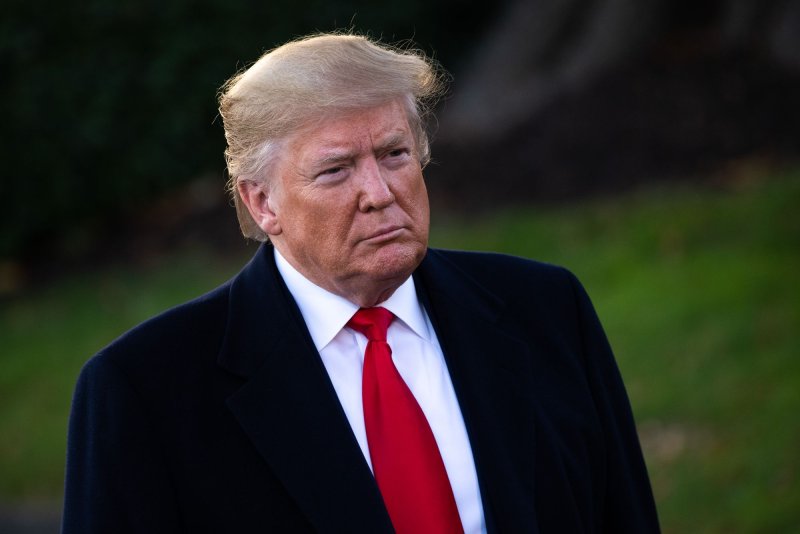Donald Trump’s presidency has (inadvertently?) hastened the demise of both political parties, depriving moderate Americans of any representation. Photo by Kevin Dietsch/UPI |
License Photo
Nov. 13 (UPI) -- November marks three anniversaries, two of which changed the world, so far.
The first was the armistice that ended World War I in 1918, creating the forces that would conspire to spark another world war and the Cold War. The second is the 30th anniversary of the demolition of the Berlin Wall separating east from west in 1989. That marked the beginning of the end of the Union of Soviet Socialist Republics in 1991 and ultimately the emergence of an assertive Russia.
The third, and by comparison seemingly minuscule, event was the election of Donald Trump as America's 45th president in 2016. While its significance so far pales in comparison with the end of the Great War and the Berlin Wall falling, the danger is that Trump is testing the limits of the Constitution and the American political system. The impeachment hearings this week could be the fuse that ignites this potential explosion.
The armistice ending the war ultimately was catastrophic. After World War I, Vladimir Lenin, Adolf Hitler and a global depression emerged. Lenin returned to Russia in the infamous secret train. The Bolshevik Revolution made the USSR into an ideological state opposed to the West and to capitalism.
Post-war Germany was wrecked. Crippling reparations were imposed. These and other forces enabled Hitler and the Nazis to create the Third Reich that came close to destroying Western civilization. With Hitler's defeat, Joseph Stalin and the Soviet Union filled the gap, starting a Cold War that lasted for almost five decades.
The second anniversary did not turn out well either. After the wall came down and Mikhail Gorbachev's perestroika and glasnost ended the Soviet Union, Russia struggled to find its role. After 20 years as president and prime minister in between, Vladimir Putin put Russia back on the global stage. Playing a weak hand with great skill, Putin has made Russia a major player in Europe, the Middle East and increasingly elsewhere. As the United States retrenches, Russia moves in.
Make no mistake: Putin has domestic political, economic and social issues despite public opinion support in the high 60 percent range. But Russia has re-emerged as an adversary and to many Americans a threat to the West. Hence, the collapse of the wall has not led to the harmony and high expectations of 1989. Cynics would say quite the opposite.
Any discussion of the long-term impact of Trump is filled with political nuclear time bombs. Trumpists claim any presidential criticism is a combination of Trump Delusional Syndrome, "fake news," left-wing propaganda and efforts to reverse the 2016 election and are unfair and misguided. Impeachment is a "witch hunt" on steroids; done in secret by Democrats in the House, whose hearings were a mix of a kangaroo court and star chamber proceeding that circumvented or prevented due process.
The formal hearings approved by a partisan House confirm these allegations of unfairness. And the charges about withholding aid to Ukraine unless Joe Biden and his family were investigated, even if true, violated no law.
Anti-Trumpists, namely Democrats and a few homeless Republicans expelled from the party for holding traditional Republican views, see Trump as the worst president in history. His disregard for or ignorance of the law, lying and distortion of facts and truth, profiting from office, vulgarity, incompetence, vindictiveness and narcissism make him unfit. His actions in Ukraine, along with obstruction of justice in which the Mueller Report cites 10 possible examples, demand impeachment and conviction.
The major danger, however, is this: Trump's presidency has (inadvertently?) hastened the demise of both political parties, depriving moderate Americans of any representation. The Democratic Party has lurched far (far) left, and the Republican Party has abandoned its decades' long policies of fiscal conservatism at home and engagement abroad and is now the party of Trump. The crucial question is whether the Constitution and system of checks and balances can tolerate the absence of two mainstream political parties.
Whether you are a Trump supporter or Trump hater, this mutation of both political parties is pushing America in the wrong direction. In these circumstances, the impeachment process will be a political fight to the death in which truth and fact will be less relevant than protecting or convicting the president.
Any transit into unknown and uncharted political waters is filled with peril. Impeachment could irreversibly divide America and make the political differences between the two parties permanent. Trump's unpresidential behavior and reliance on policy by tweet widen this divide. Unlike the Richard Nixon and Bill Clinton impeachment stories, both did not wreck the nation. This one could, regardless of the outcome.
Harlan Ullman is UPI's Arnaud de Borchgrave Distinguished Columnist and a senior adviser at the Atlantic Council. His latest book is "Anatomy of Failure: Why America Has Lost Every War It Starts." Follow him @harlankullman.















